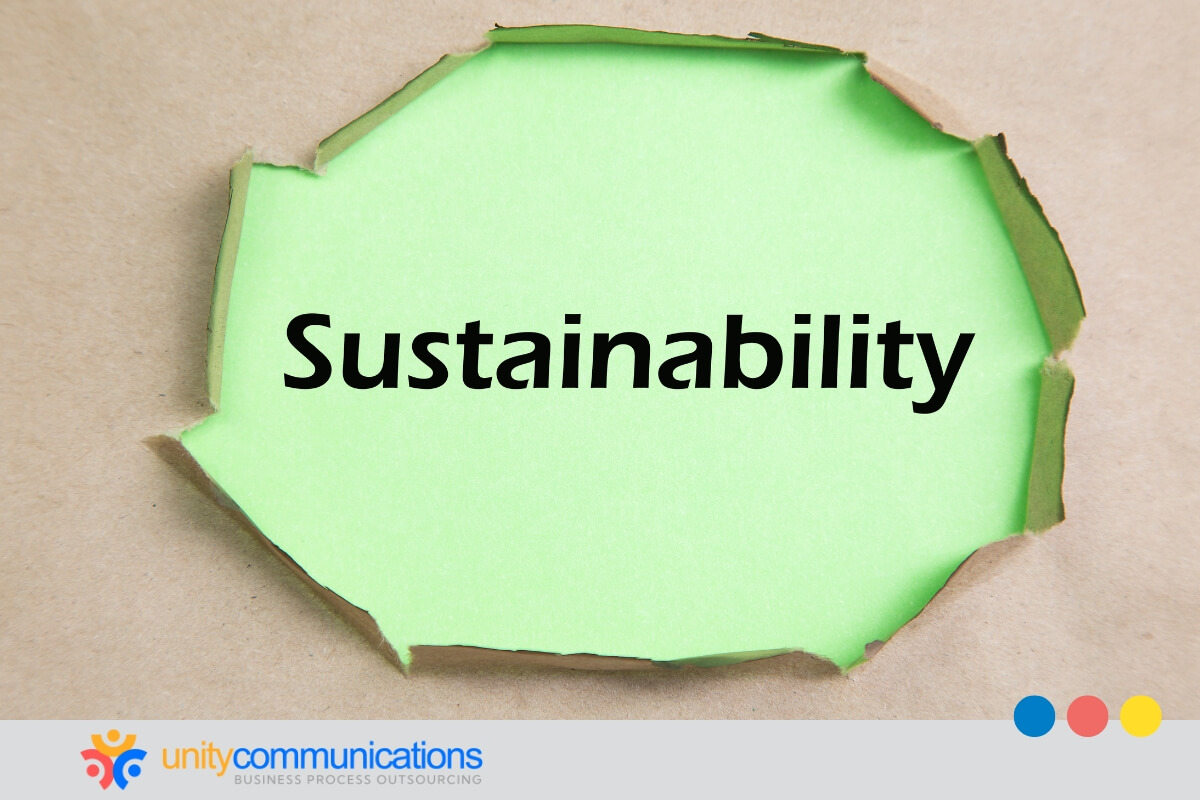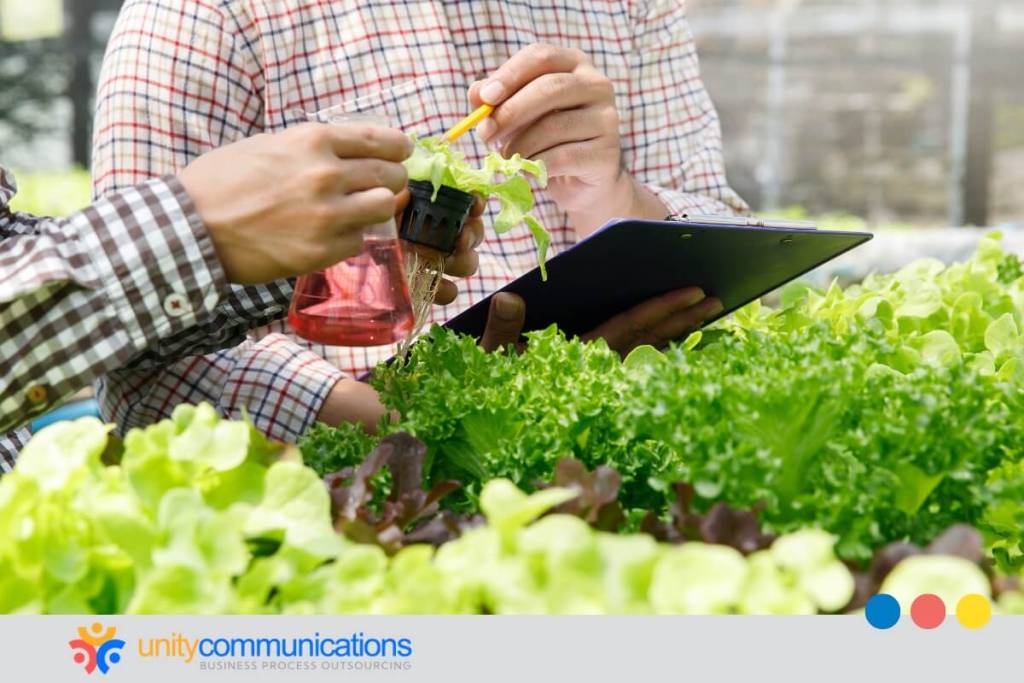IN THIS ARTICLE
Table of Contents
Integrating technology into agriculture has led to smart farming practices that optimize productivity, sustainability, and resource management. However, managing the vast data, advanced tools, and complex processes required for these operations can take time and effort for farmers and agricultural businesses.
This is where business process outsourcing (BPO) becomes a crucial partner. By outsourcing essential functions such as data analysis, remote monitoring, and supply chain management to specialized BPO providers, farmers can focus on core agricultural activities while leveraging cutting-edge technology.
Keep reading to learn how BPO for smart agriculture plays a pivotal role in unlocking the farming industry’s full potential.
How BPO for smart agriculture enhances efficiency and productivity

Also known as precision agriculture or digital farming, smart farming uses advanced technologies and data-driven techniques to improve agricultural productivity, efficiency, and sustainability.
By leveraging tools such as the Internet of Things (IoT), artificial intelligence (AI), machine learning, GPS, drones, and big data analytics in the agriculture industry, farmers can optimize resources and decision-making processes.
What is BPO’s role in smart farming? BPO for smart agriculture offers various services, such as data analysis, supply chain management, remote monitoring, and support for farm management software. These services help farmers and agricultural companies implement more precise farming techniques.
Read on to learn more about BPO’s role:
1. Streamlining farm management
An average farmer produces 500,000 data points daily, including information on satellite data, equipment sensor readings, and handwritten notes. However, not all are valuable.
To manage this overwhelming influx of data, BPO for smart agriculture steps in, streamlining the process by taking over essential tasks such as data collection, analysis, and system monitoring. This allows farmers to focus on critical decision-making while BPO providers extract and use only the most valuable insights.
Precision farming relies on advanced technologies to gather and analyze real-time data on soil conditions, weather patterns, and crop health. BPO providers manage these tools while offering expert insights and automating decision-making. This minimizes manual data tracking and analysis and speeds up informed decisions.
Additionally, BPO firms often handle logistical tasks such as supply-chain management. They collaborate with third-party providers (3PLs) to prevent delays, optimize resource distribution, and run the supply chain smoothly.
By streamlining these essential but time-consuming processes, BPO helps farms increase operational efficiency, reduce costs, and boost productivity and profitability in smart agriculture.
2. Integrating IoT and advanced technologies
In 2022, the agricultural IoT market attained a value of $13.76 billion, reflecting the growing reliance on innovative technologies in farming. BPO for smart agriculture helps integrate IoT by managing the deployment, maintenance, and analysis of enabled devices, which collect real-time data on critical farming conditions.
IoT devices, such as soil sensors, weather stations, and GPS-enabled machinery, continuously monitor soil moisture, temperature, and crop health. BPO providers handle big data these devices generate, accurately process them, and transform raw information into actionable insights.
The sheer volume of data from IoT in agriculture can be overwhelming. BPO providers excel at handling, processing, and analyzing data to draw actionable insights that inform farmers’s decisions.
The benefits of integrating IoT through BPO are substantial. Farmers can precisely control operations, from irrigation and fertilization to pest management. Because it efficiently uses resources, precision reduces waste, cuts costs, and boosts crop yields.
Additionally, IoT data contributes to predictive analytics. Farmers can better anticipate disease outbreaks or adverse weather conditions and take proactive measures.
3. Supporting precision farming techniques
BPO for smart agriculture plays a crucial role in supporting precision farming techniques. They manage the technologies and data analysis required for targeted, efficient farming practices. This leads to more efficient resource use, higher crop yields, and reduced environmental impact. It also enhances productivity and sustainability in modern agriculture.
Precision farming relies on detailed, real-time information about field conditions to apply resources—such as water, fertilizers, and pesticides—exactly where they are needed, minimizing waste and maximizing yield.
BPO providers implement and oversee advanced tools such as GPS-guided equipment and remote sensing technology. They also continuously monitor soil composition, crop health, and weather patterns. By processing this data, BPO services deliver insights that enable farmers to make precise adjustments to their operations.
This level of precision helps optimize every aspect of crop production. For instance, farmers can automatically adjust smart irrigation systems based on real-time soil moisture data or apply fertilizer to areas with deficient nutrient levels.
By outsourcing these complex tasks, farmers gain access to the expertise and infrastructure to fully implement precision techniques without the burden of managing the technology themselves.
4. Improving supply chain efficiency
BPO for smart agriculture improves supply chain efficiency by optimizing the management and coordination of agricultural inputs, logistics, and product distribution.
Outsourcing supply chain operations to BPO vendors allows farmers and agricultural businesses to benefit from advanced technologies such as real-time tracking systems, automated inventory management, and data analytics.
BPO firms handle everything from procuring seeds, fertilizers, and equipment to transporting and storing harvested crops. Outsourcing these processes helps deliver the right resources at the right time, minimizing delays and reducing waste.
Additionally, BPO providers streamline the flow of information across the supply chain and improve communication between farmers, suppliers, distributors, and retailers. Such transparency reduces bottlenecks and enhances decision-making, ensuring products reach the market more quickly.
Through predictive analytics, BPO services can also forecast demand and adjust supply chain strategies accordingly to prevent overproduction or shortages. Overall, BPO for smart agriculture enhances supply chain efficiency by reducing costs, improving resource allocation, and swiftly and smoothly moving agricultural products from farm to consumer.
5. Monitoring equipment remotely
BPO for smart agriculture facilitates remote equipment monitoring, enabling farmers to manage their operations more efficiently. By leveraging cloud-based management systems, BPO providers can continuously track the performance and condition of agricultural machinery, including tractors, irrigation systems, and harvesting equipment.
Remote monitoring allows real-time data collection on equipment metrics such as operational hours, fuel consumption, and maintenance needs. With this information, farmers can receive timely alerts about potential issues, such as equipment malfunctions, prevent costly downtime, and enhance productivity.
Additionally, remote monitoring enables farmers to analyze equipment performance trends, informing their decisions regarding upgrades or replacements. BPO providers often offer support in setting up these monitoring systems, ensuring that farmers can utilize the latest technology without the burden of managing it themselves.
The ability to monitor equipment remotely streamlines farm operations and contributes to more sustainable practices by optimizing resource use and extending the lifespan of valuable agricultural machinery.
6. Facilitating access to expert knowledge and resources
BPO for smart agriculture facilitates access to expertise and resources by connecting farmers with specialized providers.
Many farmers need more in-depth technical expertise to implement advanced techniques such as precision agriculture, data analytics, and modern supply chain management. BPO providers bridge this gap by offering a wealth of knowledge in crop management, environmental sustainability, and the latest agricultural technologies.
Through outsourcing, farmers can access experts who analyze data, interpret market trends, and tailor advice for optimizing farming operations. This expertise is crucial in navigating the complexities of integrating technology into traditional farming methods.
Moreover, BPO for smart agriculture often includes access to cutting-edge tools and platforms that might be too costly or complex for farmers to implement independently. By leveraging these resources, farmers can enhance their operational efficiency, improve crop yields, and become more competitive in the agricultural market.
How BPO for smart agriculture improves sustainability and conservation practices

BPO for smart agriculture enhances sustainability and conservation processes through advanced technologies and data analytics that optimize resource efficiency and reduce environmental impact.
Integrating advanced tools and connected devices enables farmers to precisely track and manage water, energy, fertilizers, and pesticide consumption. This allows more intelligent resource allocation; crops receive precisely what they need, minimizing waste and reducing the overuse of harmful chemicals.
The agricultural sector uses approximately 69% of the world’s freshwater. Without innovative conservation strategies, this can lead to excessive water consumption and deterioration of water quality. BPO can help implement and manage innovative irrigation systems that adjust water levels based on real-time soil moisture data, preventing water wastage.
Additionally, BPO-driven data analytics help identify areas of inefficiency in farming operations and offer recommendations to reduce greenhouse gas emissions and energy consumption. By outsourcing sustainability-focused processes to BPO providers, farmers can adopt eco-friendly practices more effectively without needing in-house expertise or expensive infrastructure.
These practices conserve natural resources, improve soil health and biodiversity, and minimize the harmful effects of over-farming. As sustainability becomes an increasingly important goal for agriculture, BPO for smart agriculture helps farms adopt environmentally responsible practices while maintaining productivity and profitability.
The bottom line

BPO providers can manage logistics, supply chains, and data collection to efficiently transport agricultural products to markets. They can also support smart irrigation systems, provide optimal water usage, or manage drone operations to monitor crop growth and detect issues early.
BPO for smart agriculture helps streamline operations, reduce costs, and improve productivity with access to the latest technology and specialized expertise, ultimately supporting the growing demand for sustainable and efficient farming practices.
Want to learn more about outsourcing for smart farming? Let’s connect!





